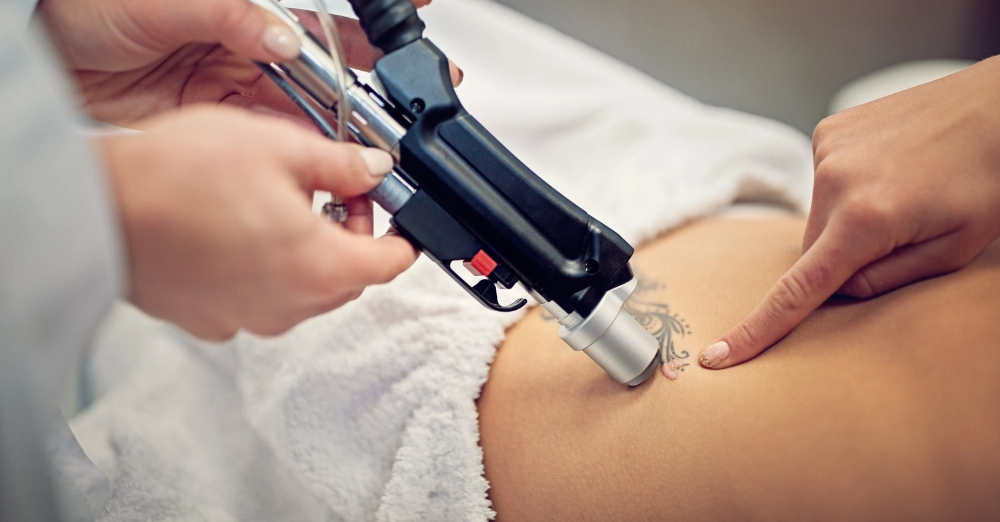Tattoo removal is gaining popularity, where lasers break down ink particles within the skin. The tattoo removal cost of this specialized procedure can depend on various factors.
The prices for tattoo removal, on average, can range from $200 to $500 per session. There may be several tattoo removal sessions needed depending on the size, location, and complexity of the tattoo.
Our Dbd guide explains the factors that affect tattoo removal costs. We also discuss the estimated tattoo removal price and procedures and provide tips for making the process more affordable.
Average tattoo removal cost

Tattoo removal can be costly and time-consuming, and the removal cost estimation can vary based on several factors.
Generally, the average tattoo removal cost can range from $200 to $500 per session.
Here are some factors that affect the removal cost:
Size
Small tattoos (less than 2 inches) cost less to erase. Bigger tattoos (Larger than 4 inches) or signs may be more expensive.
Color
Tattoos with colorful, faded, or darker colors may cost more to remove. You may need more time or special equipment. This can increase the tattoo removal expenses.
Age
The age of the tattoo can also play a role in the cost of the removal process. Older tattoos are more difficult to remove due to fading or changes in pigment or skin depth over time.
Location
The location of the tattoo on the body can also impact the cost of removal technology. The tattoos in areas with more delicate or sensitive skin may require a more careful approach.
Methods
The method of tattoo removal used can also influence the cost. Some removal procedures may be more expensive than others. For example, laser tattoo removal is one of the most common methods, but it can be more expensive than other non-laser tattoo removal methods.
Number of sessions
Some tattoos may require more sessions to be removed. It usually takes 5-10 sessions to take away a tattoo. This can cost anywhere from $150 – $1,000 or more.
Before getting the tattoo taken off, talk to your tattoo removal specialist about how many sessions it will take. This will help you decide how much it will cost overall.
Methods of tattoo removal and their cost
There are different ways to remove tattoos. Each one has its own advantages and disadvantages. Some methods also cost more than others. Here is some information about each one: [1]ASDS, “Tattoo removal, https://www.asds.net/skin-experts/skin-conditions/tattoo-removal#:~:text=Dermabrasion,Surgical%20excision”
Laser removal

Laser treatments use high-intensity light beams to break up the ink in your skin. It is usually the most effective way to get rid of a tattoo. The laser tattoo removal cost range of $200 to $500 per session.
However, it may require multiple sessions to remove the tattoo fully. Some individuals experience discomfort or side effects such as scarring or skin discoloration.
Surgical excision

Surgical excision involves a doctor physically removing the tattooed skin tissue. Surgical excision is another effective option for larger or more complex tattoo removal.
The surgical tattoo removal cost depends on the doctor’s experience. However, this method can result in scarring or changes in skin texture.
Dermabrasion

Dermabrasion involves removing the top layer of skin with a specialized tool. Dermabrasion is a less common method of tattoo removal. The cost for tattoo removal range from several hundred to thousands of dollars.
This method is effective for smaller tattoos, but it may also result in scarring or changes in skin texture.
Insurance and financing options for tattoo removal

Insurance coverage for tattoo removal services is typically limited, as it is considered an elective cosmetic procedure. However, in some cases, insurance may cover the cost of tattoo removal if it is required medical attention.
To be eligible for insurance coverage for tattoo removal, the patient must meet the medical necessity criteria. Some examples of this are:
- The tattoo is causing physical harm, such as an infection or allergic reaction.
- The tattoo causes psychological harm, such as severe depression or anxiety.
- The tattoo is on an area affected by a medical condition or treatment.
Financing options may be available to help individuals manage the cost of tattoo removal. Some common financing options include:
- Installment Plans: Many tattoo removal clinics offer payment plans that allow you to spread out the cost of the procedure over several months.
- Medical Loans: You can also obtain a medical loan from a financial institution, which will allow you to pay for the procedure over a longer period of time.
- Credit Options: Credit cards are another option for financing tattoo removal, but it’s important to consider the interest rates and fees associated with using credit cards.
It’s important to research the different financing options available and compare the interest rates terms. Some tattoo removal clinics offer discounts or promotions for multiple sessions or referrals.
Related Stories
- Check out our guide for all hair transplant cost.
- Find out everything about mole removal costs with our comprehensive guide.
- Want to get your tooth fixed? Check our guide on how much does it cost to fix a chipped tooth – here.
- Find out everything about Gum graft cost with our guide.
- Do you not want glasses anymore? Check our guide to find out everything about Lasik eye surgery cost.
FAQs
Does tattoo removal cost vary based on the size of the tattoo?
Yes, the cost of tattoo removal can vary based on the size of the tattoo. Generally, larger tattoos require more time and resources to remove, which can increase the overall cost of the procedure.
What factors affect the price of tattoo removal?
The price of tattoo removal is affected by the size, color, age, and location of the tattoo, as well as the individual’s skin type and response to treatment.
Additionally, the choice of removal method and the number of sessions required can also impact the total cost.
Are there any additional costs associated with tattoo removals, such as aftercare or consultation fees?
Yes, some tattoo removal clinics may charge additional fees for aftercare or consultation.
It is important to inquire about any aftercare costs to avoid unexpected expenses. This can include the cost of numbing cream of another removal cream.
Does insurance cover the cost of tattoo removal?
Yes, insurance coverage for tattoo removal is usually limited. However, in some cases, insurance may cover the cost of tattoo cover-up if it necessitates medical attention.
Is laser tattoo removal more expensive than other methods of tattoo removal?
Yes, laser tattoo removal is more expensive than other methods, such as surgical excision or dermabrasion.
However, the total cost will depend on several factors, so it is important to discuss the pros and cons of each method with a qualified specialist.
Tattoo removal cost can be a worthwhile investment for those seeking to remove unwanted tattoos.
By understanding the factors that influence the cost of tattoo removal, individuals can opt for the best options for complete tattoo removal.
- 107shares
- Facebook Messenger
About the author
DbdPost Staff is a team of writers and editors working hard to ensure that all information on our site is as accurate, comprehensive, and trustworthy as possible.
Our goal is always to create the most comprehensive resource directly from experts for our readers on any topic.




